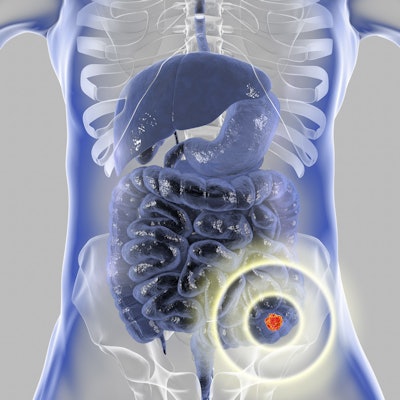
A new machine-learning platform helped identify patients with colorectal cancer and predict disease severity with high accuracy in a study of circulating tumor DNA (ctDNA) samples, Chinese researchers reported in Science Translational Medicine.
The study involved the application of a machine-learning algorithm to the development of diagnostic and prognostic models, based on a cohort of 801 patients with colorectal cancer and 1,021 healthy controls. A diagnostic prediction model assessing a panel of DNA methylation markers accurately distinguished patients from healthy individuals with a sensitivity and specificity of 87.5% and 89.9%, respectively, and outperformed the clinically available blood test for carcinoembryonic antigen (CEA). Modeling also predicted the prognosis and survival of colorectal cancer patients, a statistically significant result.
The researchers noted that a single ctDNA methylation marker -- cg10673833 -- demonstrated sensitivity of 89.7%, specificity of 86.8%, and an area under the curve of 0.90 for detecting colon cancer and precancerous lesions in a prospective study of 1,493 samples from high-risk people that compared blood testing with colonoscopy.
The findings show the value of ctDNA methylation markers for diagnosis in asymptomatic individuals, as well as for surveillance and predicting outcomes following a diagnosis of colon cancer, the researchers concluded.
"The results of this study offer support for setting up large-scale randomized clinical trials to validate its clinical applicability," Dr. Ruihua Xu, PhD, a professor of oncology at Sun Yat-Sen University Cancer Center in Guangzhou, China, and colleagues wrote (Sci Transl Med, January 1, 2020, Vol. 12:524).
Early detection essential
Colorectal cancer is the third most deadly cancer in the world, and early detection is essential to improving survival. There has been limited success in developing effective, noninvasive diagnostic approaches for colorectal cancer as an alternative to invasive and inconvenient colonoscopies, which require preprocedure bowel cleansing.
Circulating tumor DNA is a powerful diagnostic and prognostic biomarker in many cancers. The researchers therefore wanted to explore the predictive diagnostic power of a machine-learning algorithm using cell-free DNA (cfDNA). For the study, cfDNA methylation data were randomly divided into training and validation datasets to build diagnostic and prognostic models.
The researchers developed cfDNA methylation markers for colorectal cancer; then, they determined the efficacy of CpG markers (common methylation sites in cancer mutations) in screening for colorectal cancer. Prediction modeling was constructed with nine selected methylation markers out of a dataset with a total of 544 markers.
The diagnostic model accurately discriminated patients with colorectal cancer from normal individuals, the researchers found. They suggested that the methylation markers are associated with carcinogenesis and the development of colorectal cancer.
The prognostic model was constructed using another five-marker panel. In the model, the score could effectively distinguish patients with colorectal cancer who had different prognoses and was validated as an independent prognostic risk factor in a multivariable analysis.
The researchers identified two molecular subgroups of interest based on cfDNA methylation. Cluster 1 tumors were frequently observed in women with left-sided lesions, while cluster 2 tumors were associated with significantly poorer survival rates indicative of stage III and IV disease.
The research was limited by a short clinical follow-up time of approximately 26 months, and further studies with longer surveillance periods are needed, Xu and colleagues noted.



















